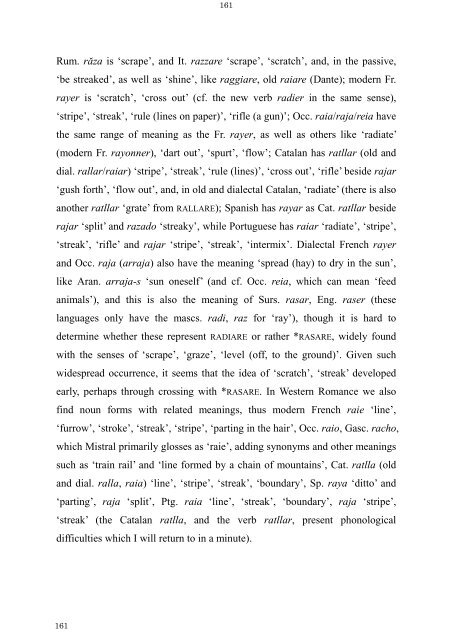The Latin Neuter Plurals in Romance - Page ON
The Latin Neuter Plurals in Romance - Page ON
The Latin Neuter Plurals in Romance - Page ON
You also want an ePaper? Increase the reach of your titles
YUMPU automatically turns print PDFs into web optimized ePapers that Google loves.
161<br />
161<br />
Rum. răza is ‘scrape’, and It. razzare ‘scrape’, ‘scratch’, and, <strong>in</strong> the passive,<br />
‘be streaked’, as well as ‘sh<strong>in</strong>e’, like raggiare, old raiare (Dante); modern Fr.<br />
rayer is ‘scratch’, ‘cross out’ (cf. the new verb radier <strong>in</strong> the same sense),<br />
‘stripe’, ‘streak’, ‘rule (l<strong>in</strong>es on paper)’, ‘rifle (a gun)’; Occ. raia/raja/reia have<br />
the same range of mean<strong>in</strong>g as the Fr. rayer, as well as others like ‘radiate’<br />
(modern Fr. rayonner), ‘dart out’, ‘spurt’, ‘flow’; Catalan has ratllar (old and<br />
dial. rallar/raiar) ‘stripe’, ‘streak’, ‘rule (l<strong>in</strong>es)’, ‘cross out’, ‘rifle’ beside rajar<br />
‘gush forth’, ‘flow out’, and, <strong>in</strong> old and dialectal Catalan, ‘radiate’ (there is also<br />
another ratllar ‘grate’ from RALLARE); Spanish has rayar as Cat. ratllar beside<br />
rajar ‘split’ and razado ‘streaky’, while Portuguese has raiar ‘radiate’, ‘stripe’,<br />
‘streak’, ‘rifle’ and rajar ‘stripe’, ‘streak’, ‘<strong>in</strong>termix’. Dialectal French rayer<br />
and Occ. raja (arraja) also have the mean<strong>in</strong>g ‘spread (hay) to dry <strong>in</strong> the sun’,<br />
like Aran. arraja-s ‘sun oneself’ (and cf. Occ. reia, which can mean ‘feed<br />
animals’), and this is also the mean<strong>in</strong>g of Surs. rasar, Eng. raser (these<br />
languages only have the mascs. radi, raz for ‘ray’), though it is hard to<br />
determ<strong>in</strong>e whether these represent RADIARE or rather *RASARE, widely found<br />
with the senses of ‘scrape’, ‘graze’, ‘level (off, to the ground)’. Given such<br />
widespread occurrence, it seems that the idea of ‘scratch’, ‘streak’ developed<br />
early, perhaps through cross<strong>in</strong>g with *RASARE. In Western <strong>Romance</strong> we also<br />
f<strong>in</strong>d noun forms with related mean<strong>in</strong>gs, thus modern French raie ‘l<strong>in</strong>e’,<br />
‘furrow’, ‘stroke’, ‘streak’, ‘stripe’, ‘part<strong>in</strong>g <strong>in</strong> the hair’, Occ. raio, Gasc. racho,<br />
which Mistral primarily glosses as ‘raie’, add<strong>in</strong>g synonyms and other mean<strong>in</strong>gs<br />
such as ‘tra<strong>in</strong> rail’ and ‘l<strong>in</strong>e formed by a cha<strong>in</strong> of mounta<strong>in</strong>s’, Cat. ratlla (old<br />
and dial. ralla, raia) ‘l<strong>in</strong>e’, ‘stripe’, ‘streak’, ‘boundary’, Sp. raya ‘ditto’ and<br />
‘part<strong>in</strong>g’, raja ‘split’, Ptg. raia ‘l<strong>in</strong>e’, ‘streak’, ‘boundary’, raja ‘stripe’,<br />
‘streak’ (the Catalan ratlla, and the verb ratllar, present phonological<br />
difficulties which I will return to <strong>in</strong> a m<strong>in</strong>ute).









